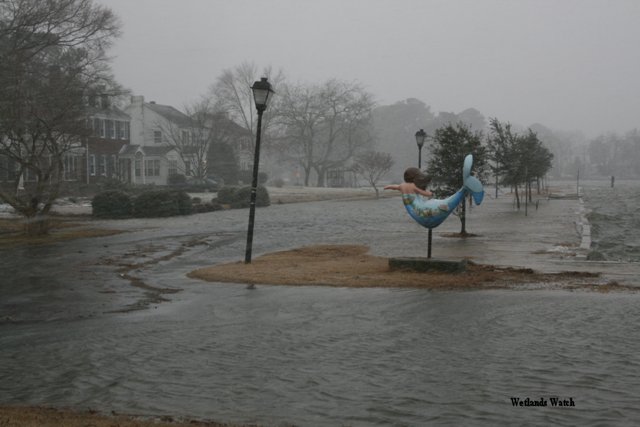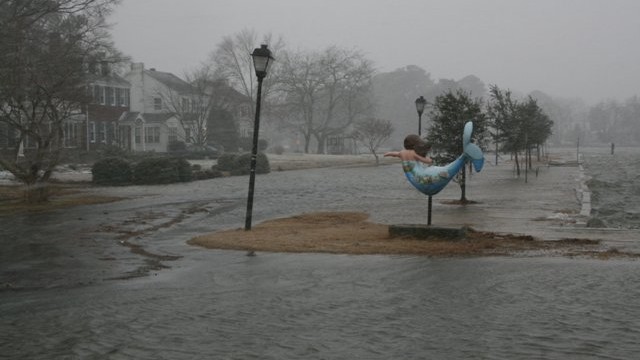By Lori Crouch
Dutch Dialogues Virginia: Life at Sea Level will bring experts on urban water management – from engineers to planners – to Hampton Roads to discuss, discover and design ideas and solutions for the future. The kick-off session is scheduled for Friday, June 19, from 9 a.m. to noon. It will be held at Slover Library, 235 E. Plume Street in Norfolk, and it is open to the public.
Design sessions will continue on Saturday, Sunday and Monday. The final session will include preliminary recommendations from 9 a.m. to noon on Tuesday, June 23. The public is invited to watch during Slover Library’s normal operating hours.
Dutch Dialogues workshops are the latest component of the long history and friendship between the Kingdom of the Netherlands and the United States, and more recently between the Netherlands, Louisiana and Virginia. Dutch Dialogues include approaches to integrated water management that have been acquired over centuries of living with water and have been adapted and applied, in part, in post-Katrina New Orleans. These concepts are being shared to address water problems in American cities such as flooding, poor water quality, sea level rise and land subsidence.
The initial Dutch Dialogues were held in New Orleans, and similar workshops have been held in New York, Bridgeport, St. Louis, Tampa Bay and Los Angeles. The evolving Dutch approach to living with water integrates flood risk mitigation, engineering, spatial planning, urban design, environmental restoration, community amenities and economic development. While such integration is challenging, it provides incredible opportunities to innovate for flood risk reduction, improved quality of life for the economies and people in waterfront communities such as Norfolk and Hampton, the two cities participating in this workshop.
Dutch Dialogues were conceived by David Waggonner, principle of New Orleans-based Waggonner and Ball Architects, and the Netherlands Embassy in Washington, D.C. They bring together Dutch and American urban designers, engineers, landscape architects, planners, academics, and government officials to explore creative solutions and holistic concepts for flood risk reduction, resiliency, and smart redevelopment. In New Orleans, Dutch Dialogues led to the development of the award-winning Greater New Orleans Urban Water Plan (www.livingwithwater.com), and, in New York, this approached informed the Rebuild by Design Competition (www.rebuildbydesign.org).
“Norfolk has enjoyed a long relationship with the Royal Netherlands Embassy.” said Norfolk Mayor Paul Fraim. “Our cities share a common bond over water, and we have appreciated their partnership as we tackle the effects of flooding in our city. We look forward to taking the next step in our partnership by hosting the Dutch Dialogues. We expect to learn about innovative ideas on water management from some of the best experts in the world while providing our regional partners an opportunity to develop plans of their own.”
“Hampton’s 124 miles of waterfront provide us with a major asset, but also increasingly with challenges,” said Hampton Mayor George Wallace. “Based on their knowledge, skills and experience, I want to thank the Dutch government and Waggonner and Ball for collaborating to help Hampton develop creative and innovative ways to meet those challenges.”
“While the Netherlands has 800 years of experience in living with water, which is always beneficial but also sometimes disastrous, we continue to perfect our knowledge and adapt our approaches and landscape to present needs. Sea level rise will surely complicate our lives, but in our endeavors to adapt to it we can also make our cities better, safer and more resilient places to live. We are happy to share our knowledge with the US on this, and will also learn much through our partnerships with experts from cities like New Orleans, Hampton and Norfolk,” said Rudolf Bekink, the Netherlands Ambassador to the US.
“Slover Library is the perfect place for these workshops,” said Slover Library Foundation President Harry Lester. “From its initial concept, Slover was designed to be the community gathering place to encourage and stimulate discussions on the most important issues facing our region.”
Dutch Dialogues Virginia will evaluate challenges within the context of the regional landscape and in particular sites in Hampton and Norfolk. Workshop participants will look for ways to:
- Reduce the impacts of both catastrophic and recurrent flooding
- Take advantage of riverfronts, shorelines and stream alignments to improve water quality, reduce flooding and improve ecosystems
- Naturalize engineered storm water systems
- Revitalize and redevelop urban waterfronts and nearby communities
- Re-establish links between natural systems and neighborhoods via parks and other amenities
- Stimulate redevelopment, tax base and economic opportunities
- Supplement ,where possible, hardscape with permeable surfaces
- Mitigate impacts of future sea level rise and increased storm surge
- Explore how existing sand nourishment, dune protection, and shoreline improvements can contribute to beachfront communities
The possibility of hosting Dutch Dialogues in Hampton Roads began in a conversation between the City of Norfolk and the Royal Netherlands Embassy in 2012. In 2014, the Hampton Roads Planning District Commission was brought into the conversation with a proposal to expand the geographic scope to the region. Localities were invited to submit proposals for study sites. Two sites, the Tidewater Drive District of Norfolk and the Newmarket Creek watershed in Hampton and Newport News were selected from the list of proposals.
At the workshop’s conclusion, the teams will identify a number of site-specific and proto-typical strategies that promote integrated water management and resiliency that are applicable for communities across Hampton Roads. A report will be issued by fall, and a final report will be available by the end of the year.





